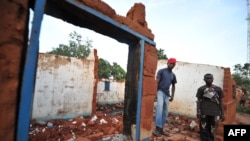A new report on the human rights situation in the Central African Republic says combating impunity is key to achieving national reconciliation and a durable peace in the war-torn country. The report from a U.N. investigator was submitted to the U.N. Human Rights Council on Monday.
The report says atrocities and human rights violations continue to be committed by various armed groups in the Central African Republic, including by the mainly Muslim ex-Seleka, the largely Christian anti-Balaka, and FACA, the Armed Forces of the C.A.R.
U.N. investigator Yao Agbetse accuses them of pillaging and looting villages and of threatening the civilian population with violence to exact illegal taxes.
He expresses particular concern about reports of ongoing human rights abuse by Russian mercenaries employed by the Wagner Group, a private security company, which reportedly has close ties with FACA.
He says witnesses have reported many crimes perpetrated by the mercenaries. Agbetse told the council they include sexual violence, intimidation, destruction of homes, racketeering, and torture.
“The Russian bi-lateral forces have also hindered investigations where violations of human rights were committed… As regards contractual relations with the C.A.R., under international law, the Russian bi-lateral forces are not a recognized international body,” he said.
Therefore, said Agbetse, the responsibility for violations falls on the Central African Republic government, which must take all measures to achieve justice for the victims.
In response, C.A.R. Minister of Justice Djoubaye Abazene told the U.N. council that his government is making major reforms. He says it is improving the security sector and has a new judicial and court system, which is working to shed light on allegations of human rights abuse.
“Investigations are now open for all presumed allegations in cases of human rights violations. Whoever the perpetrators may be and whatever their positions may be, they will be brought to justice and punished. You can be reassured of that,” he said.
The president of the C.A.R. Truth, Justice and Reparations Committee, Marie-Edith Douzima, said 87% of the population thinks it is possible to have lasting peace in the C.A.R. — providing those responsible for violence are punished.
She said it is vital to combat impunity for the C.A.R. to find a way out of the repeated crises afflicting the country. She noted that to date, no victims of sexual or other crimes have received compensation and reparations. That wrong, she added, must be rectified.





